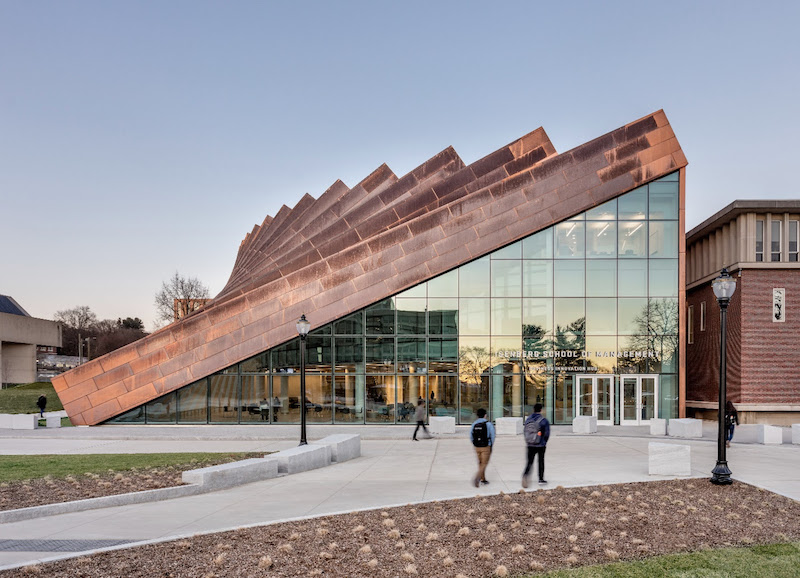Umass Amherst’s new 70,000-sf Business Innovation Hub combines a new expansion with the partial renovation of the Isenberg School of Management. Bjarke Ingels Group (BIG) designed the building with Goody Clancy as the architect of Record.
The building doubles the school’s current space and introduces new facilities for more than 150 staff and 5,000 students in undergraduate, master’s, and PhD programs. The exterior is wrapped in straight, vertical pillars that gradually slope downward, creating a domino effect and a triangular glass entrance. The exterior’s copper cladding will naturally weather from a dark ochre to a patina with long-term exposure to the elements.
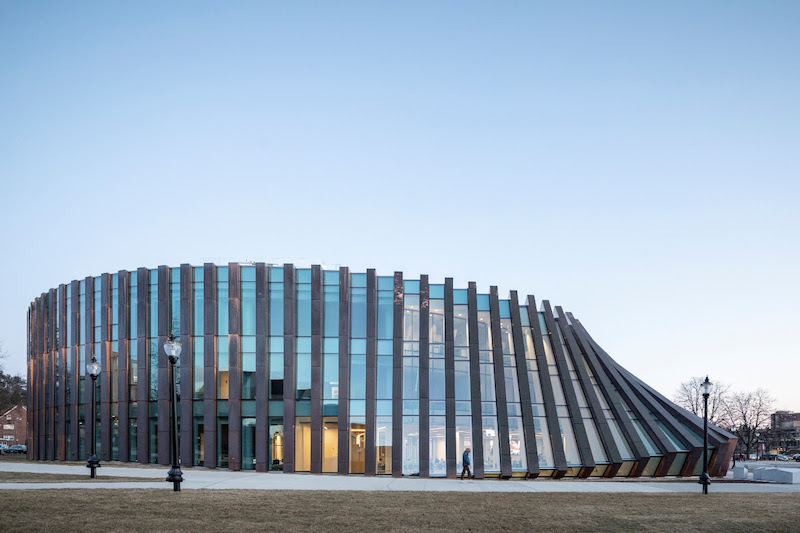 Photo: Laurian Ghinitoiu.
Photo: Laurian Ghinitoiu.
Students and faculty will enter into the naturally-lit, 5,000-sf Learning Commons. This will be a place for learning, networking, and dining. The Learning Commons can also double as a venue for guest speakers, ceremonies, banquets, and career fairs.
See Also: 17-story Data Sciences building to rise on Boston University campus
The Business Innovation Hub extends directly into the existing 1964 building from the north and east sides in a wide circular loop. The loop consolidates Isenberg’s faculty and staff under one roof and creates a circular place of arrival. Various conference rooms and breakout areas are distributed throughout the loop.
 Photo: Laurian Ghinitoiu.
Photo: Laurian Ghinitoiu.
“The new Business Innovation Hub at the Isenberg School of Management is conceived as an extension of both the building and the campus mall,” said Bjarke Ingels, Founder and Creative Director, BIG, in a release. “The linear structure is bent to form a full loop framing an internal courtyard for the life of the students. The façade is pulled away in a domino effect to create a generous invitation from the Haigis Mall to the Learning Commons. The mall and the courtyard – inside and outside form a forum for the students, the faculty and the profession to meet, mingle and mix society and academia.”
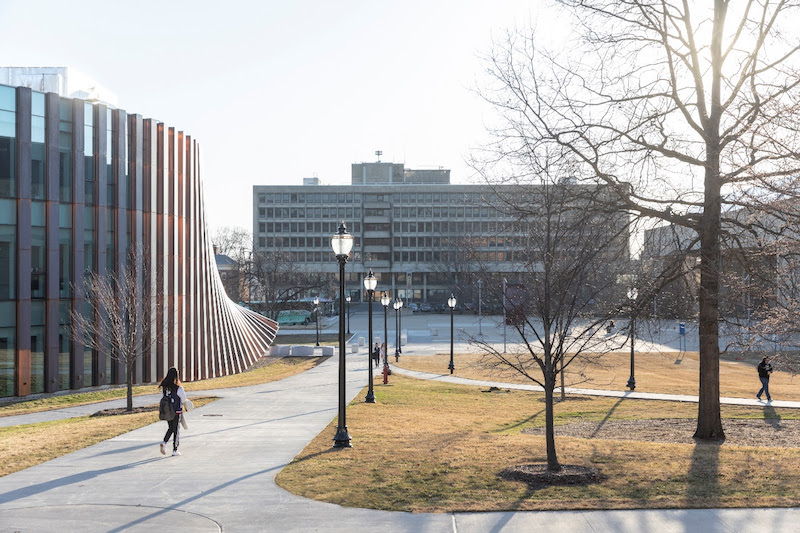 Photo: Laurian Ghinitoiu.
Photo: Laurian Ghinitoiu.
Innovation labs, advising spaces, and faculty offices are located on the second and third floors. Classrooms are equipped with integrated technology for distance learning and can be easily transformed for theater-style lectures or small group work.
The inner spaces of the extension face a circular courtyard that connects back to the campus via two pathways between the original Isenberg building and the Business Innovation Hub. Two bridges above these paths fuse the buildings.
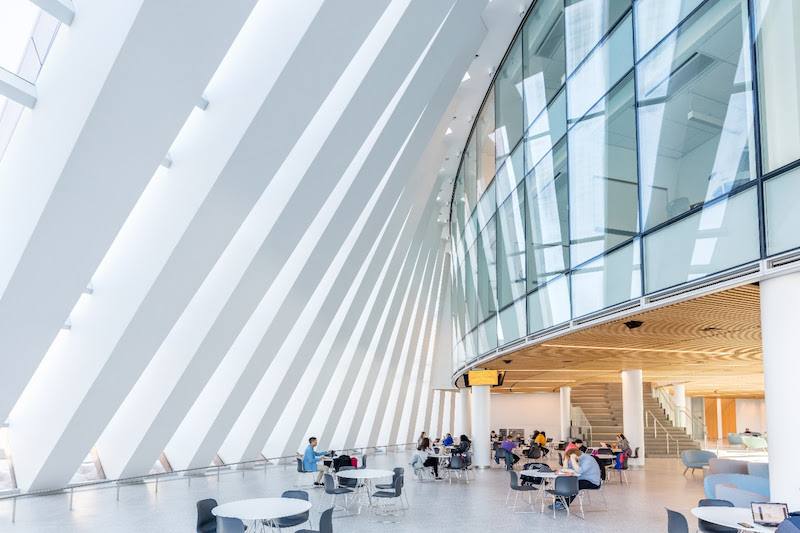 Photo: Max Touhey.
Photo: Max Touhey.
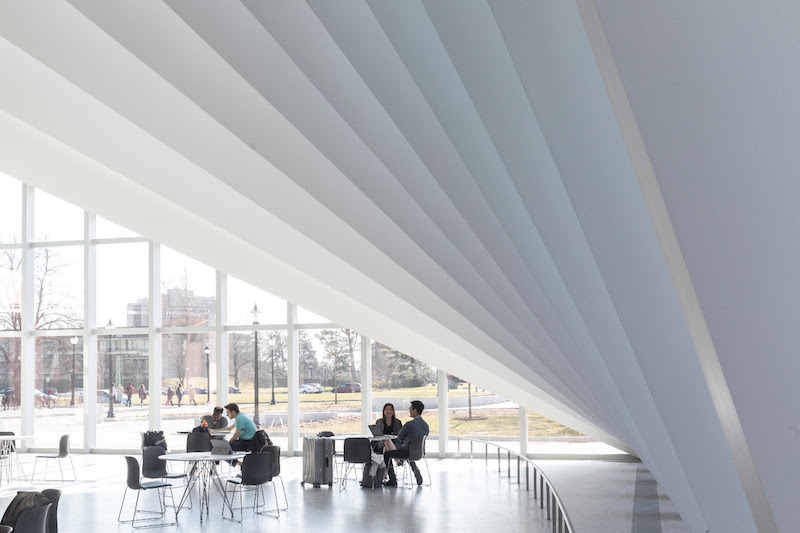 Photo: Laurian Ghinitoiu.
Photo: Laurian Ghinitoiu.
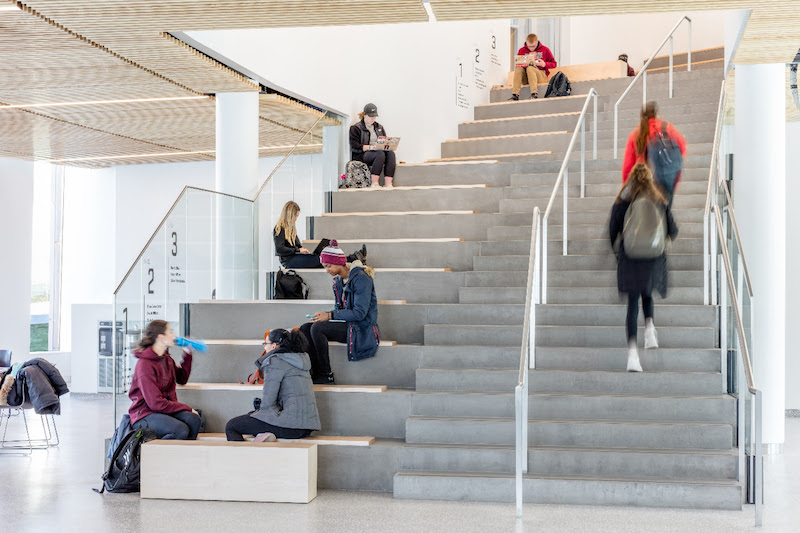 Photo: Max Touhey.
Photo: Max Touhey.
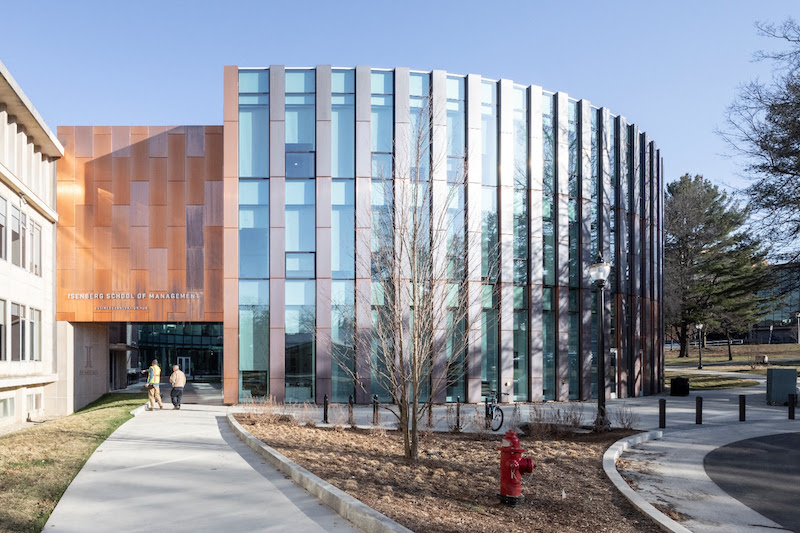 Photo: Laurian Ghinitoiu.
Photo: Laurian Ghinitoiu.
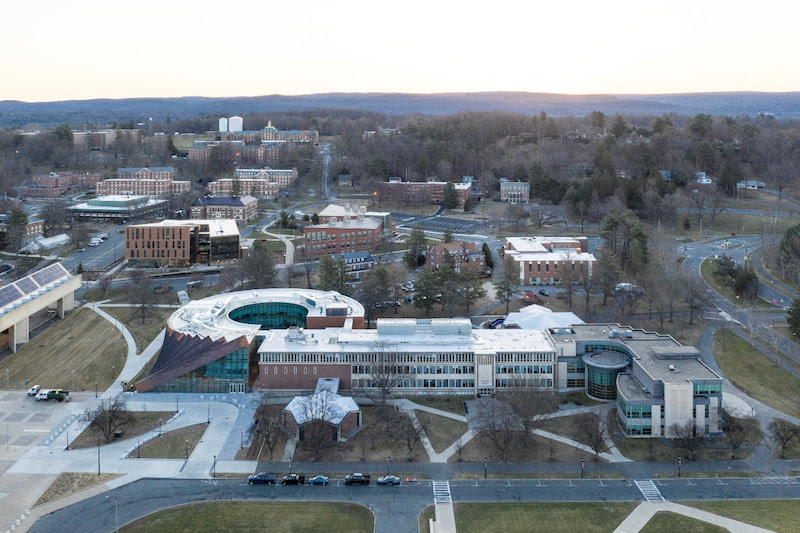 Photo: Laurian Ghinitoiu.
Photo: Laurian Ghinitoiu.
Related Stories
| Sep 13, 2010
Richmond living/learning complex targets LEED Silver
The 162,000-sf living/learning complex includes a residence hall with 122 units for 459 students with a study center on the ground level and communal and study spaces on each of the residential levels. The project is targeting LEED Silver.
| Sep 13, 2010
'A Model for the Entire Industry'
How a university and its Building Team forged a relationship with 'the toughest building authority in the country' to bring a replacement hospital in early and under budget.
| Sep 13, 2010
Committed to the Core
How a forward-looking city government, a growth-minded university, a developer with vision, and a determined Building Team are breathing life into downtown Phoenix.
| Aug 11, 2010
JE Dunn, Balfour Beatty among country's biggest institutional building contractors, according to BD+C's Giants 300 report
A ranking of the Top 50 Institutional Contractors based on Building Design+Construction's 2009 Giants 300 survey. For more Giants 300 rankings, visit http://www.BDCnetwork.com/Giants
| Aug 11, 2010
Jacobs, Arup, AECOM top BD+C's ranking of the nation's 75 largest international design firms
A ranking of the Top 75 International Design Firms based on Building Design+Construction's 2009 Giants 300 survey. For more Giants 300 rankings, visit http://www.BDCnetwork.com/Giants
| Aug 11, 2010
Stimulus funding helps get NOAA project off the ground
The award-winning design for the National Oceanic and Atmospheric Administration’s (NOAA) new Southwest Fisheries Science Center (SWFSC) replacement laboratory saw its first sign of movement on Sept 15 with a groundbreaking ceremony held in La Jolla, Calif. The $102 million project is funded primarily by the American Recovery and Reinvestment Act (ARRA), resulting in a rapidly advanced construction plan for the facility.
| Aug 11, 2010
JanCom Technologies expands headquarters
JanCom Technologies, Inc., an Austin, Texas-based technology, infrastructure, audio-visual, and critical power systems consulting and engineering services firm, continues to grow due to an influx of high-profile international projects. The company recently expanded to a 5,000-square-foot office space at 206 Wild Basin Road. The move represents a 2,000-square-foot increase in space to accommodate the company’s growth.
| Aug 11, 2010
Rouss & Robertson Halls
University of Virginia McIntire School of Commerce
Charlottesville, Va.
Rouss Hall, a historic 24,000-sf building designed by Stanford White, served as the home of the University of Virginia’s McIntire School of Commerce from 1955 to 1975. Thirty years later, the university unveiled plans to have the business school return to the small, outdated 110-year-old facility, but this time with the addition of a 132,000-sf companion building to be named Robertson Hall.
| Aug 11, 2010
Steel Joist Institute announces 2009 Design Awards
The Steel Joist Institute is now accepting entries for its 2009 Design Awards. The winning entries will be announced in November 2009 and the company with the winning project in each category will be awarded a $2,000 scholarship in its name to a school of its choice for an engineering student.
| Aug 11, 2010
Arup, SOM top BD+C's ranking of the country's largest mixed-use design firms
A ranking of the Top 75 Mixed-Use Design Firms based on Building Design+Construction's 2009 Giants 300 survey. For more Giants 300 rankings, visit http://www.BDCnetwork.com/Giants


